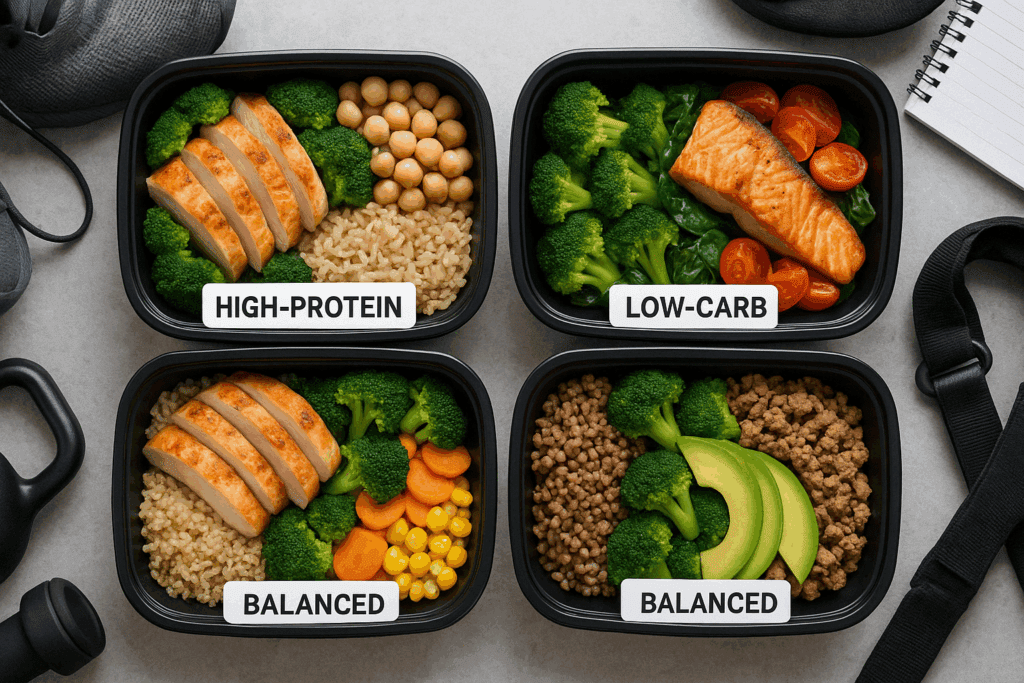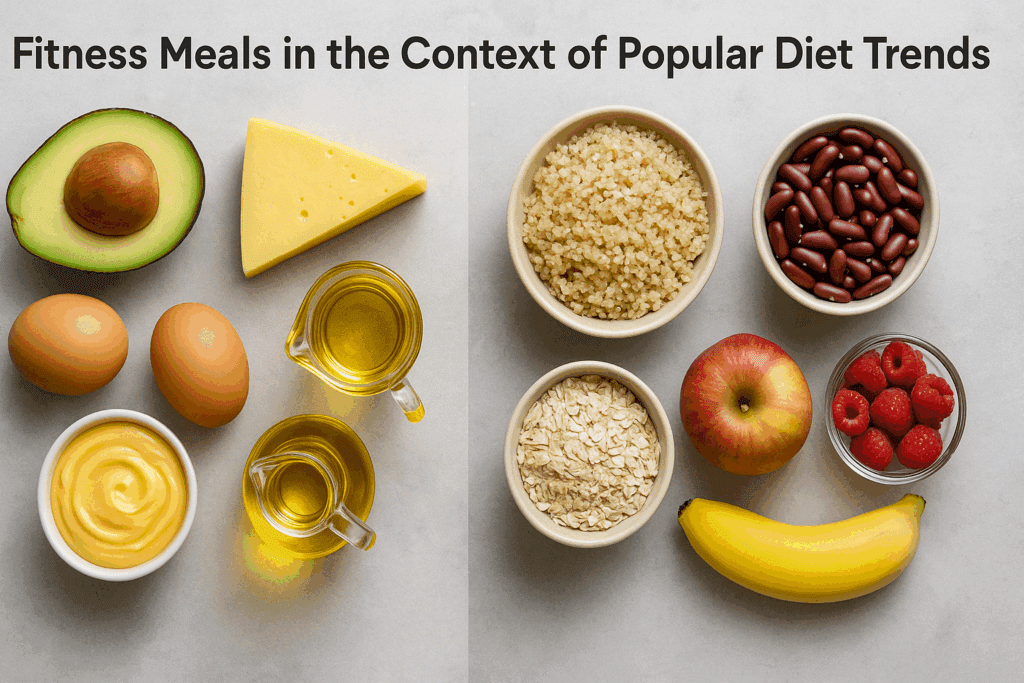In a fast-paced world where convenience often trumps nutrition, more individuals are seeking structured, science-backed approaches to eating that align with both their physical goals and broader wellness aspirations. One increasingly popular solution is the use of a fitness meal prep service. Designed to deliver nutritionally balanced meals tailored for active lifestyles, these services are more than just a shortcut to dinner. They represent a bridge between mindfulness and metabolic health, empowering individuals to eat with intention, track progress with ease, and stay committed to long-term health goals without sacrificing quality or flavor.
You may also like: Smart Meal Prep for Weight Loss: Expert-Approved Lunch Ideas and Recipes to Stay on Track
Fitness meal prep services fit seamlessly within the broader movement toward mindful eating and holistic wellness. These services offer more than just calorie control; they promote an awareness of what you’re eating, why you’re eating it, and how it supports your body’s unique needs. For those navigating the challenges of dietary planning—especially within plant-based or clean-eating frameworks—fitness meal delivery is a powerful tool that merges convenience with evidence-based nutrition.
Understanding the Role of Fitness Meal Prep Services in Modern Nutrition
At their core, fitness meal prep services are designed to eliminate guesswork from the dietary equation. By pre-portioning macronutrients, balancing micronutrients, and removing artificial additives, they simplify the process of eating clean while aligning with personal health objectives. Unlike traditional takeout or convenience foods, these meals are carefully constructed with performance and recovery in mind.
Fitness meals aren’t just about protein counts or cutting carbs—they reflect a nutritional philosophy that prioritizes whole ingredients, dietary variety, and sustainable choices. These meals often feature legumes, leafy greens, lean proteins, and healthy fats in precise combinations that support satiety, reduce inflammation, and stabilize blood sugar levels. Whether you’re looking to build muscle, lose weight, or maintain optimal energy levels, a high-quality meal service can offer consistent support without requiring daily kitchen effort.
Furthermore, gym prepared meals offer athletes and everyday exercisers alike a powerful way to match their physical output with appropriate nutritional input. After all, the relationship between exercise and recovery is deeply intertwined with what—and when—you eat. Instead of making reactive decisions based on convenience, users of meal services can engage in proactive nutrition tailored to their specific training goals.

Promoting Mindful Eating Through Structured Meal Planning
Mindful eating, a practice rooted in awareness, intention, and presence, can be difficult to maintain in the face of modern dietary chaos. A fitness meal prep service helps users reconnect with their food by promoting portion control, macronutrient awareness, and ingredient transparency. When meals are thoughtfully curated and free of distractions like marketing gimmicks or impulse purchases, the path to mindful eating becomes far less cluttered.
Research supports the connection between structured meal planning and healthier eating habits. A study published in the International Journal of Behavioral Nutrition and Physical Activity found that individuals who plan their meals are more likely to follow dietary guidelines, consume a wider variety of fruits and vegetables, and maintain healthier body weights. By outsourcing the logistics of meal prep, users are freed to focus on the experience of eating itself—chewing slowly, savoring flavors, and tuning into satiety signals.
In this way, meal services offer more than convenience. They create conditions conducive to mindfulness: meals that are balanced, predictable, and free of nutritional ambiguity. Over time, this predictability helps to rewire habits and reduce emotional or stress-driven eating. Instead of reacting impulsively to hunger, users learn to anticipate their needs and nourish their bodies with meals that support rather than sabotage their goals.

The Psychological Benefits of Fitness Meal Prep Services
Beyond nutrition and physical health, there’s a growing recognition of how structured meal planning supports mental well-being. Decision fatigue, a common phenomenon in modern life, refers to the mental exhaustion that comes from making too many choices throughout the day. This fatigue can impair self-control and lead to poor dietary decisions, especially when hunger strikes.
Fitness meal services effectively eliminate this fatigue by providing ready-to-eat meals that meet dietary goals without requiring daily deliberation. This reduction in cognitive load has profound psychological implications. When individuals no longer need to debate what to eat, they can devote more mental energy to other priorities such as work, relationships, or personal growth.
Additionally, gym prepared meals support a sense of accomplishment and routine. There’s a psychological reward in sticking to a plan and watching one’s health markers improve over time. These services allow users to track their intake consistently, observe how their bodies respond, and stay engaged with the process of change. For many, the structure offered by meal delivery services becomes a grounding force—an anchor amid the flux of daily life.
Supporting Long-Term Goals with Evidence-Based Nutrition
Many diets fail not because they’re ineffective in theory, but because they’re unsustainable in practice. This is especially true for approaches that restrict entire food groups or require excessive preparation. A fitness meal prep service bridges this gap by offering meals that are nutritionally dense, time-saving, and aligned with long-term adherence.
Sustainability is particularly relevant in the conversation surrounding low-carb and ketogenic diets. Questions like “is keto a low carb diet,” “is a keto diet sustainable,” or “keto diet vs low carb diet” arise frequently in health discussions. While the ketogenic diet emphasizes very low carbohydrate intake to induce a state of ketosis, many people find the rigidity difficult to maintain over time. In contrast, a low-carb diet offers more flexibility and may be more compatible with a sustainable lifestyle, particularly when supported by professionally curated meals.
The best fitness meal prep services take these nuances into account by offering customizable plans that align with dietary preferences—whether that’s a moderate low-carb approach, a clean plant-based diet, or a high-protein plan tailored for muscle gain. Users can explore different meal frameworks without the trial-and-error burden of self-cooking, allowing for consistency without monotony.

Fitness Meals in the Context of Popular Diet Trends
The rise of diet frameworks like the ketogenic diet has generated intense interest in low-carb eating. Still, confusion remains over key questions: “is keto no carbs?”, “low carb diet keto diet—what’s the difference?”, and “is keto a good diet for the long term?” A well-rounded fitness meal prep service can help demystify these distinctions by offering meals designed with specific carb counts and macros that match either a strict keto approach or a more flexible low-carb pattern.
While keto diets typically restrict carbs to under 50 grams per day, often resulting in ketosis, low-carb diets can allow up to 100–150 grams of carbs depending on individual needs and activity levels. Understanding the ketogenic diet vs low carb frameworks requires a degree of nutritional literacy that not all consumers possess, which is why guided meal plans can be so valuable.
For those asking “is keto a good diet,” the answer depends on context. It may offer benefits for short-term weight loss, glycemic control, and neurological conditions, but sustainability and nutrient adequacy can be concerns. A fitness meal service can help mitigate these risks by ensuring that meals are balanced, diverse, and nutritionally sufficient—even when adhering to more restrictive paradigms.
Meal Prep as a Tool for Behavior Change and Habit Formation
True transformation in health often stems not from dramatic overhauls but from consistent, incremental behavior changes. A fitness meal prep service supports this kind of evolution by introducing structure, reducing friction, and reinforcing positive habits over time. By receiving meals that are aligned with specific goals, users reinforce the connection between intention and action.
This consistency is particularly valuable when transitioning to plant-based or whole-food eating styles. Many individuals express interest in reducing meat consumption, increasing their intake of vegetables and legumes, or avoiding processed foods—but are unsure how to translate that intention into practice. Fitness meal plans that emphasize clean, whole ingredients and nutrient diversity provide a practical entry point into this lifestyle shift.
Additionally, the presence of fitness meals in one’s daily routine can serve as a behavioral cue, encouraging other wellness-supporting actions such as hydration, physical activity, and mindful eating practices. Over time, this cumulative effect helps users build a lifestyle that supports—not undermines—their health goals.

Comparing Meal Services: What to Look For in a Quality Provider
Not all fitness meal prep services are created equal. To support mindful eating and sustainable health improvements, it’s important to evaluate potential providers based on a few key criteria. First and foremost, ingredient quality matters. The best services use minimally processed, whole-food ingredients, avoid artificial additives, and offer transparency about sourcing and preparation methods.
Second, menu variety is crucial. A rotating menu with global flavors and seasonal produce not only keeps meals interesting but also supports nutritional diversity—an essential element of long-term health. Whether users are pursuing a vegan, paleo, or low-carb strategy, the ability to rotate between meal styles helps prevent dietary boredom and increases compliance.
Third, customization should be available. Fitness meal services that allow users to adjust macronutrient ratios or select meals aligned with dietary restrictions are more likely to support personalized goals. Some services even offer filters for sodium content, allergens, or glycemic load, making them suitable for individuals with chronic health conditions or specific performance targets.
The Future of Fitness Meals in the Wellness Economy
As awareness grows around the connection between food, performance, and mental well-being, fitness meals are poised to play an even larger role in personal health strategies. What began as a niche offering for bodybuilders and athletes has expanded into a diverse ecosystem of options for anyone seeking health-conscious, time-saving meals.
The trend also reflects a broader shift away from rigid dieting paradigms toward flexible, evidence-based approaches to eating. Increasingly, consumers are asking nuanced questions: “keto diet vs low carb diet—which is more sustainable?”, “is keto a good diet for my activity level?”, and “how can gym prepared meals support recovery and mental clarity?” The answers depend not on ideology but on practicality and personalization—qualities that meal prep services are uniquely equipped to deliver.
By meeting people where they are and offering scalable, convenient solutions, fitness meal services are helping redefine what it means to eat well in the 21st century. They make health accessible, mindful eating attainable, and long-term goals realistic—not aspirational.

Frequently Asked Questions: How a Fitness Meal Prep Service Can Support Mindful Eating and Long-Term Health Goals
1. How can a fitness meal prep service improve adherence to specific dietary plans?
A fitness meal prep service can significantly enhance adherence by removing the burden of daily decision-making, which often leads to dietary slip-ups. When meals are pre-portioned, nutritionally balanced, and scheduled in advance, users are more likely to follow their targeted macronutrient ratios or caloric goals without second-guessing their food choices. Additionally, many services offer tracking tools or nutrition labels, which support those following structured programs like macro counting, intermittent fasting, or carb cycling. These systems help users measure success more tangibly. By delivering meals that align with fitness goals, whether plant-based or protein-heavy, a fitness meal prep service simplifies compliance and sustains motivation.
2. What role do gym prepared meals play in athletic performance and recovery?
Gym prepared meals offer more than just post-workout fuel; they are designed to meet the unique timing and composition needs of athletic recovery. Proper nutrient timing—particularly regarding protein and carbohydrate intake—can influence glycogen replenishment, muscle protein synthesis, and inflammation reduction. A gym prepared meal typically includes fast-absorbing carbs paired with high-quality proteins, ideal for the post-exercise window when the body is primed for nutrient absorption. This not only accelerates recovery but may also reduce the likelihood of injury over time. For those training multiple times per week, having gym prepared meals on hand ensures that nutritional needs are met consistently, supporting sustained performance gains.
3. Are fitness meal services customizable for people with food allergies or intolerances?
Many fitness meal prep service providers now offer customization options tailored to food sensitivities and dietary exclusions. From gluten-free and dairy-free options to nut-free or low-FODMAP menus, the industry is evolving to accommodate a wide range of nutritional needs. Clients can often select meals based on ingredient exclusions or opt for allergen-specific plans curated by dietitians. This level of personalization ensures that even individuals with complex health profiles can benefit from structured meal planning without compromising safety. Fitness meal services with transparent labeling and robust customer support can be especially beneficial for those managing chronic conditions triggered by food.
4. Can gym prepared meals support mental clarity and focus throughout the day?
Absolutely. Beyond physical benefits, gym prepared meals play a role in stabilizing blood sugar and providing steady energy—key factors in maintaining cognitive performance. Meals rich in complex carbohydrates, omega-3s, and B vitamins support neurotransmitter production and reduce mental fatigue. By eliminating blood sugar crashes that can follow highly processed meals, a fitness meal offers sustained focus and mental sharpness. Especially for professionals balancing demanding schedules with fitness routines, consistent nutrition through gym prepared meals may enhance productivity and reduce brain fog. Pairing mental performance with physical recovery positions these meals as tools for holistic wellness.
5. How do fitness meals encourage better portion control without restrictive dieting?
Fitness meals are strategically portioned based on evidence-backed serving sizes and calorie needs for common fitness goals. This removes the need for users to count calories or weigh ingredients, which can be burdensome and often leads to either under- or overeating. The structure of each fitness meal supports satiety by balancing proteins, complex carbs, and healthy fats in appropriate ratios. Unlike restrictive diets that emphasize elimination, these meals foster a sense of abundance while still keeping portions within optimal ranges. Over time, users may develop an intuitive sense of proper serving sizes, making portion control second nature—even outside of the meal plan.
6. Are there psychological benefits to using a fitness meal prep service beyond physical health?
Yes, and they are often underestimated. A fitness meal prep service helps reduce decision fatigue, which is the mental exhaustion that stems from making too many choices—especially around food. This streamlining of daily nutrition reduces stress and creates a greater sense of control, which can improve emotional regulation and mood. Moreover, consistently following a meal plan and seeing progress can increase self-efficacy, boosting confidence in one’s ability to meet health goals. These psychological shifts are essential for sustainable change, as behavior patterns around food are often more emotionally rooted than physically.
7. How do fitness meal services differ from traditional diet meal plans or subscription boxes?
While traditional diet plans often rely on calorie restriction and generalized guidelines, fitness meal services focus on functional nutrition that aligns with an active lifestyle. These services are typically more tailored in macronutrient content, making them ideal for people pursuing specific training or body composition goals. Unlike generic subscription boxes, a fitness meal prep service integrates principles of sports nutrition, offering meals timed for recovery, performance, or metabolic support. Moreover, the convenience factor of ready-to-eat meals sets them apart from kits requiring preparation. As such, these services cater to those who want both precision and efficiency in their nutrition strategy.
8. What should I look for when choosing a reliable fitness meal prep service?
When evaluating providers, it’s important to prioritize ingredient transparency, chef and dietitian credentials, and the flexibility of the meal options. A high-quality fitness meal prep service will offer full macronutrient breakdowns, sourcing information, and seasonal menu rotations to support nutritional variety. Look for services that provide meals cooked in registered kitchens, use sustainable packaging, and allow users to select meals based on fitness goals such as bulking, cutting, or maintaining. Additionally, customer support and user reviews can offer insight into reliability and satisfaction. A trustworthy service will not only deliver convenience but also uphold nutritional integrity.
9. Can fitness meal prep services support people transitioning to plant-based or flexitarian diets?
Yes, many fitness meal prep services now include extensive plant-based or vegetarian options, making them a strong asset for those shifting dietary patterns. These meals are typically crafted to meet protein needs using legumes, soy, quinoa, and other complete plant-based proteins. Transitioning to a new diet can be challenging in terms of meal creativity and nutrient adequacy, but a fitness meal service alleviates that pressure by offering pre-validated meals that meet dietary standards. This also makes it easier to test flexitarian or meatless days without compromising nutritional intake. Over time, users often gain the confidence and inspiration needed to recreate similar meals on their own.
10. How do gym prepared meals support people with demanding travel or work schedules?
For busy professionals or frequent travelers, gym prepared meals eliminate the chaos of trying to find healthy food on the go. These meals can be refrigerated, frozen, and easily reheated, offering a predictable and nutritionally sound option regardless of location. Fitness meal services that ship nationally or offer flexible delivery windows cater especially well to remote workers, consultants, and athletes who are constantly on the move. Unlike hotel or restaurant fare, gym prepared meals allow users to maintain consistency in macro tracking, digestion, and energy regulation—factors that often falter during travel. This continuity supports long-term adherence to health goals, even in dynamic environments.

Conclusion: Embracing Fitness Meal Prep as a Path to Sustainable Wellness
In the pursuit of sustainable wellness, few tools are as practical and transformative as a well-structured fitness meal prep service. By taking the guesswork out of daily nutrition and providing meals that are aligned with personal health and fitness goals, these services foster mindfulness, support consistency, and bridge the gap between intention and action. Whether one is exploring a plant-based lifestyle, navigating the nuances of a ketogenic vs low carb diet, or simply striving to eat more whole foods, fitness meals provide a flexible yet reliable foundation.
Crucially, these services help answer some of today’s most pressing health questions—such as “is a keto diet sustainable,” “is keto no carbs,” and “which is better: ketogenic diet vs low carb?”—by offering real-world examples of dietary strategies in action. Instead of relying on fad diets or theoretical frameworks, users experience firsthand how different eating styles affect their energy, mood, and performance.
Fitness meal prep services embody the intersection of nutrition science, behavioral psychology, and culinary innovation. They serve as a reminder that mindful eating isn’t about restriction or perfection—it’s about alignment, intentionality, and progress. As more people seek ways to eat with purpose and live with vitality, these services offer not just meals, but a meaningful path forward in the journey toward long-term health.
Was this article helpful? Don’t let it stop with you. Share it right now with someone who needs to see it—whether it’s a friend, a colleague, or your whole network. And if staying ahead on this topic matters to you, subscribe to this publication for the most up-to-date information. You’ll get the latest insights delivered straight to you—no searching, no missing out.
Further Reading:
Mindful Eating 101 — A Beginner’s Guide
How to Meal Prep — A Beginner’s Guide
Disclaimer
The information contained in this article is provided for general informational purposes only and is not intended to serve as medical, legal, or professional advice. While NewsHealthWatch strives to present accurate, up-to-date, and reliable content, no warranty or guarantee, expressed or implied, is made regarding the completeness, accuracy, or adequacy of the information provided. Readers are strongly advised to seek the guidance of a qualified healthcare provider or other relevant professionals before acting on any information contained in this article. NewsHealthWatch, its authors, editors, and contributors expressly disclaim any liability for any damages, losses, or consequences arising directly or indirectly from the use, interpretation, or reliance on any information presented herein. The views and opinions expressed in this article are those of the author(s) and do not necessarily reflect the official policies or positions of NewsHealthWatch.

